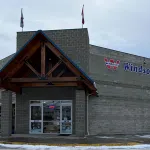Duteau Creek water quality could be destroyed by a wildfire
The Duteau Creek watershed is a main source of drinking water for the Greater Vernon area, and there are ongoing concerns about the potentially catastrophic impact a major wildfire could have on the supply.
As witnessed following major wildfires in watersheds in Colorado, water supplies were adversely impacted for years afterward. During active burning, ash and contaminants associated with ash settle on streams, lakes and reservoirs. Vegetation that holds soil in place and retains water is burned away, causing turbidity and other water quality issues.
The Greater Vernon Advisory Committee had an audience Wednesday with Ray Crampton, district manager with the Ministry of Forests, Lands, Natural Resource Operations and Rural Development, on efforts to accelerate the Duteau Watershed Wildfire Protection Plan and be updated on other local projects.
“We have $5 million in projects in the Okanagan to protect lives, homes and infrastructure” Crampton said in his opening remarks. “We don’t get anything done without our Indigenous and municipal partners.”



